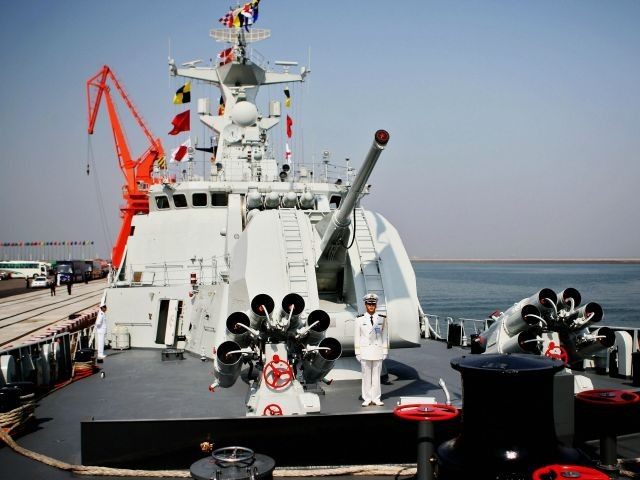Chinese state media is working hard to portray President Xi Jinping’s visit to the United States as a success, but even in a column intending to herald bilateral talks as a step in the right direction, Xinhua asserts that it is the United States which is prompting states to be “aggressive” in the South China Sea.
In a column titled “Asia-Pacific not China-U.S. wrestling ring,” Xinhua’s columnists praise what they claim is progress between the two nations in maintaining peaceful relations in the region. The article makes sure to note that any aggressive behavior in the South China Sea is directly the consequence of American, and not Chinese, actions, however.
“Washington’s sizeable [sic] enlargement of its already formidable military presence in the Asia-Pacific has emboldened some claimants in the South China Sea territorial disputes to make counterproductively aggressive moves, although the United States pledges not to take sides on the complex rows,” the authors write, accusing America’s “outdated Cold War mentality” of being the “root of those impediments” in the bilateral relationship. The article quotes a professor from Singapore as claiming that any threat the United States might perceive from China is “more cognitive than real.”
The article is more optimistic than condemning, however, going so far as to dismiss the South China Sea tensions as “sparring” between the two powers, implying that protests from nations like Vietnam and the Philippines are part of a larger proxy dispute and not inherently worth addressing. “Notwithstanding their recent sparring over South China Sea, the two countries have kept a generally cooperative and productive relationship in the region,” the article concludes.
Chinese state media has previously published articles claiming that war between China and the United States is “inevitable” so long as America agrees with nations claiming that China is usurping its sovereign territory and maintains a presence in the region. Studies have concluding that the Chinese military has destroyed at least 17 reefs in the Spratly and Paracel Islands, parts of which belong to the Philippines, Vietnam, Malaysia, and Brunei. The American State Department warned China to stop building its artificial islands, calling them “sandcastles,” in the region in May.
The Chinese government made a bizarre announcement in June that its “reclamation” of territory in the South China Sea would “soon” be “complete,” without defining what the “reclamation” process is, what its end would mean for neighboring countries, or the exact timeline defined by the word “soon.”
China’s military has not ceased its belligerence since then, however. Most recently, two Chinese fighter-bombers intercepted an American surveillance plane in the region, flying at an “unsafe” proximity to the American plane. The incident occurred a week before the heads of state of both countries announced new protocol to handle encountering each other in the region. “The rules are basic,” the Wall Street Journal reports, “If one military aircraft initiates a call, the other military aircraft should actively respond, if mission permits.” These rules apply in all international waters which, the WSJ notes, would not include the South China Sea according to the Chinese government, which considers the entire sea sovereign Chinese territory. Thus, it is unclear how this new protocol would affect any behavior in the region at all.
Reports claim the South China Sea dispute did arise in conversation between the two heads of state over the weekend. According to Taiwan’s South China Morning Post, President Obama claims his conversation with Xi on the matter was “candid,” and Xi allegedly claimed the territory China has developed for itself to be part of the country since “ancient times.”
Xi’s attitude toward the South China Sea dispute, to the extent that the topic has come up, during his visit to the United States has not reflected the on-the-ground behavior of the Chinese government. In a speech upon arriving in Seattle, Xi assured listeners that China wanted “to work with other countries in the region… to maintain peace and security in the Asia Pacific.”

COMMENTS
Please let us know if you're having issues with commenting.